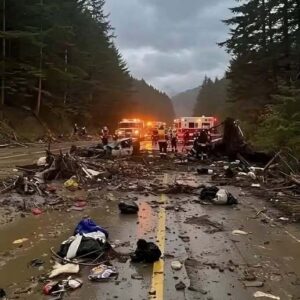The Sound of Bells and Silence
The bells of St. Michael’s rang low, each chime like a slow heartbeat echoing through the ancient stone of the church. It was the kind of sound that didn’t just fill a room—it settled into your skin, your bones, your chest. A sound you didn’t just hear, but felt.
Ana stood at the front of the church, her feet heavy, unmoving. Everything around her seemed soaked in a shadow too thick for the sun to pierce. The stained-glass windows scattered soft colors across the pews and floor, but even those rays felt muted, subdued—like they, too, were in mourning.
The sweet scent of incense lingered in the air, thick and relentless, mingling with the aged smell of old wood and melted candlewax. Beneath her black veil, Ana’s face was hollow. Her eyes—once lively and full of fire—were now rimmed with shadows, fixed on the single point that consumed her entire world.
The coffin.
It rested at the front of the altar, surrounded by white lilies and velvet cloth, heavy and still like the final punctuation at the end of a sentence that came too soon.
Rareș.
Her husband. Her partner. Her forever—now a memory trapped in polished wood.
Beside her, squirming in her arms, was Sofia—their two-year-old daughter. The child’s cheeks were flushed, her nose red and wet from crying, though she didn’t fully understand why. She only knew that something was terribly wrong. That the man she called “Daddy” wasn’t smiling anymore. That people in black had filled their home. That no one had laughed in days. That her mother didn’t smell like lavender and bread anymore, but like tears and silence.
Sofia reached a tiny hand toward the coffin, her sobs turning into breathless cries.
“Daddy! Daddy!”
Ana clutched her tighter, trying to hush her with kisses and murmurs, but her own throat was raw—too raw for words to sound soft.
The crowd murmured quietly behind them. Family. Friends. Strangers, even. Some stared in pity. Others bowed their heads. But no one knew what to say. What could you say to a young widow holding a fatherless child?
The priest had just begun his blessing when it happened.
Sofia stilled.
For a heartbeat, her squirming ceased. Her tiny fingers curled into Ana’s black coat, and her wet eyes blinked, almost as if adjusting to something unseen.
She looked at the coffin again. Then whispered:
“Daddy says… you don’t have to cry, Mommy.”
Ana froze.
A shiver, like ice water, traveled down her spine.
The priest stopped mid-prayer. The crowd stilled. Even the air held its breath.
Ana’s hands trembled. “What did you say, Sofia?”
The little girl turned her face upward. Her eyes—still rimmed with tears—now seemed lit from within, glassy and focused, but not frightened.
“He said… it’s not cold. And we have to go home. There’s light there. And he loves us.”
The words didn’t belong to a toddler. They didn’t sound rehearsed or mimicked. They came clear, crisp, and chilling.
A woman in the back gasped audibly. Someone else dropped a prayer card. The bells had stopped, but the echo of Sofia’s voice clung to every ear, every heart.
Ana’s knees buckled slightly, and she gripped the edge of the casket for support. She looked around—at the priest, the mourners, the altar—but none of it made sense. Nothing felt real.
Then Sofia added, softly:
“He’s behind me. He’s holding my hand.”
A man in the pews crossed himself rapidly. Another whispered, “Lord, have mercy,” under his breath.
Ana turned instinctively. Behind her, there was nothing. Just shadows. Flickering candlelight.
But then—
She felt it.
A warmth. Not on her skin, but through it. A pressure. A presence. On her shoulder.
A familiar sensation—like the brush of fingers she’d known for years. Rareș’s fingers. The ones that used to rest there when he stood behind her while she washed dishes. The ones that held her tight on hospital nights. The ones that brushed her hair back after long, exhausted days.
It was impossible.
And yet, undeniable.
Ana’s lips parted. Her breath shuddered. She brought a hand to her shoulder—his shoulder—and gasped.
The tears came then. Not the broken, hopeless sobs of before. But new ones. Softer. Cleansing. The kind that felt like rain after a long, dusty drought.
Sofia nestled against her, no longer crying. Her small voice barely audible now.
“Don’t be sad, Mommy. Daddy said he’s still here.”
And in that moment—just for a moment—Ana believed her.
Because sometimes, grief isn’t just about what’s lost.
It’s about what remains.
When Love Was Just Beginning
Before the grief. Before the incense and the echoing bells of St. Michael’s. Before the heavy black veil and trembling hands.
There was light.
There was laughter.
And there was Rareș.
Ana met him when she wasn’t looking for anything—not love, not commitment, not even company. She had just graduated from university with a degree in art history and was working part-time at a gallery near the town square. Her days were filled with cataloging sculptures, organizing exhibition brochures, and staring a little too long at paintings with sad women and stormy skies.
Rareș came into her life like a sudden change of season.
He was a technician, contracted to install a new lighting system in the gallery’s main hall. Ana had come in early one morning to find him standing on a ladder, adjusting the angles of the spotlights with the focus of a surgeon and the smile of someone who wasn’t in a rush to be anywhere else.
She watched him for a while, silently amused. His hands were calloused, his sleeves rolled up, his brow slightly furrowed as he tested the brightness against a canvas of golden hues.
“You know,” Ana called out, “the artist would be flattered by how seriously you’re taking this.”
He turned his head, grinning. “Well, I’d hate to make her look dull.”
“She was a he,” Ana said, raising an eyebrow.
Rareș laughed. “Then I hope he forgives me.”
That was it.
One moment. One spark. One conversation that lingered longer than either expected.
Over the next few weeks, Rareș made excuses to stop by the gallery—sometimes to check on the lights, other times to “test” the security system. He brought coffee. Asked questions about brushwork. Told her stories about his childhood dog that hated vacuum cleaners and the time he fell into a pond trying to impress a girl who couldn’t even swim.
He made her laugh. And Ana hadn’t realized how much she missed laughing until it returned to her like a forgotten song.
He wasn’t the type she usually noticed—too ordinary at first glance. But Rareș had a presence that grew on you. He was steady. Honest. A man who kept his promises and remembered how you liked your tea. A man who didn’t speak poetry, but lived it in the way he looked at her like she was the only thing in the room that mattered.
They started dating. Walks turned into dinners. Dinners into overnight talks. And before long, Ana was no longer looking for anything—because she had already found it.
Their wedding was small but joyful. A chapel, a few close friends, and the kind of smiles that felt like sunshine. Ana wore a simple white dress. Rareș wore a navy-blue suit with a crooked tie. When they said their vows, neither one cried—they just smiled with quiet certainty.
And when Sofia was born two years later, Rareș held her like she was made of stardust.
Ana had never seen him so still, so humbled, as he gazed down at their daughter, lips trembling.
“She’s perfect,” he whispered.
And she was.
Their days became slower, richer. Ana left her job at the gallery to care for Sofia full-time. Rareș worked as a supervisor for a lighting company and always came home just before dinner. He’d sneak up behind Ana in the kitchen, wrap his arms around her waist, and kiss the back of her neck as Sofia giggled in her high chair.
They danced in the living room, sometimes with music, sometimes without.
When Sofia started talking, she always said “Da-da” first thing in the morning, reaching her arms out for Rareș like he was the sun itself.
Their love wasn’t perfect—it was real. Built not on passion alone but on trust, consistency, and the unspoken comfort of shared silence.
So when the accident happened, it wasn’t just the shock of death—it was the loss of life, a life woven together so intimately it had become indistinguishable from breath.
He had gone out for groceries.
That was all.
A routine trip. An ordinary morning.
He never came back.
A driver, a red light, a moment too late.
And just like that, the story they were writing stopped mid-sentence.
Ana had collapsed in the kitchen when the officers came to the door. She barely remembered what they said. Only that their faces were solemn and there was no “maybe” in their tone.
No miracle.
Just was.
Gone.
Since that day, she had lived in a fog. Functioning only because she had to. Speaking only when Sofia needed words. Eating only to avoid collapse.
Until the funeral.
Until Sofia’s voice broke through the darkness.
Until something shifted in that church, something no one could name.
But Ana remembered now. The way his touch felt. The warmth of his laugh. The softness in his eyes when he looked at their daughter. She remembered him, not in death, but in life.
And somehow… she believed he wasn’t truly gone.
The Whisper Beyond the Coffin
St. Michael’s Church remained still, breathless, as if the centuries-old stone walls themselves were leaning in to listen.
Sofia’s words—light and pure like wind through leaves—still hovered in the heavy air.
“He’s behind me… he’s holding my hand.”
For a long moment, there was only silence. Not even the occasional shuffle of shoes or sniffle of grief. Just the flicker of candles and the sound of distant birdsong leaking through stained-glass windows.
Then the murmurs began.
A woman clutched her rosary tighter and muttered prayers through trembling lips. A man in the back wiped tears from his face, not from sadness—but from something he couldn’t explain. One of Rareș’s elderly aunts crossed herself repeatedly, whispering, “A sign… it must be a sign.”
The priest stepped down from the altar, his eyes not on the pulpit, but fixed on the child in her mother’s arms. He didn’t speak, just observed—like one would watch a flame flicker, unsure whether it would fade or grow.
Ana was still frozen.
Her heart pounded, not from fear, but from something deeper—something ancestral, sacred. Sofia’s tiny body was warm against hers, but Ana’s shoulder… where she had felt the touch… was warmer.
Not metaphorically. Not in her imagination.
It was like a quiet sun had brushed against her skin and disappeared.
She could still feel it.
And somehow, she knew.
Rareș.
It was him.
Tears welled in her eyes, but this time, they didn’t sting like salt—they came gently, like rain over parched earth. Sofia had quieted now, resting her head against Ana’s chest, fingers loosely tangled in the black fabric of her mother’s dress.
The child’s eyes fluttered, still damp but no longer scared.
“He said it’s sunny where he is,” Sofia mumbled, as if half-asleep. “He said it smells like oranges.”
Ana gasped, barely audible—but the priest caught it.
He stepped closer. “My child… what is it?”
Ana’s lips trembled. “Rareș… used to say that heaven—if it exists—must smell like oranges. Sweet and warm. Like summer mornings when the windows are open.”
The priest’s eyes widened slightly. “And your daughter… has she ever heard him say that?”
Ana shook her head. “No. Never. Not once.”
They hadn’t discussed such things around her. Sofia was two. Their conversations were about blocks, and bananas, and bedtime stories. Not heaven. Not death.
Certainly not orange-scented afterlives.
The priest nodded slowly, as though confirming something deep within himself.
From the pews, others stirred. A man stepped forward—a family friend who’d once served in the military. His hands shook as he spoke.
“I was… stationed overseas when my brother died. We were twins. After the funeral, my daughter—she was just a baby—woke up crying one night. Said ‘Uncle says goodbye.’ She’d never even met him.”
The room grew still again.
It was as if something ancient had entered the space. Not something dark. But something powerful. A thin thread between this world and the next had revealed itself through the voice of a child.
Sofia stirred again, lifting her head. Her cheeks were flushed, but her gaze was clear.
“He’s not sad,” she said, pointing to the coffin. “He said he’s okay. He’s… tall now.”
A nervous laugh escaped someone in the second row.
“Tall?” Ana whispered.
“Like light,” Sofia said with a sleepy yawn. “He said he’s tall like the church. And he’s not sick anymore.”
Ana swallowed the sob that tried to rise.
Rareș had struggled with his health the last year. He hadn’t told many people—not wanting pity—but Ana knew the signs. The fatigue. The headaches. The silent worry in his eyes as he rubbed his temples. The doctor’s appointment he had postponed.
Sofia… couldn’t have known.
The priest, kneeling now before them, reached out gently.
“Sometimes, the veil is thin,” he said softly. “And children… they see through it. With eyes still too innocent to doubt.”
Ana looked around. At the faces of neighbors, coworkers, friends. Some cried. Some crossed themselves. Some simply stared at Sofia like they were seeing something divine.
Then the girl leaned closer to her mother and said something only Ana could hear:
“He says he kissed you on the forehead. This morning.”
Ana gasped.
She had felt it.
As she woke up, blurry with sleep and grief, she had felt something soft—warm—on her forehead. She’d dismissed it as memory. As imagination. But now…
Her hands shook. Her knees gave out.
She knelt right there, in the aisle, holding her daughter close, and wept.
Not from despair.
From knowing.
From feeling.
Rareș was gone—but not lost.
Dead—but not absent.
His love had not ended with the stopping of his heart. It had simply… changed form.
And somehow, in that small, trembling church, with incense still hanging in the air and grief filling every corner, there was suddenly room for something else.
Hope.
Signs in the Silence
The day after the funeral, Ana awoke with puffy eyes and a stiff body.
Her muscles ached from grief the way they might after a fall. Every step she took felt like walking through molasses. The house—once filled with laughter, babbling, and the occasional clang of Rareș fixing something in the kitchen—was unbearably still.
She stood in the doorway of their bedroom, staring at the untouched side of the bed. The indentation of his body on the mattress was still faintly visible, like a ghost refusing to disappear.
Sofia was already awake.
Ana found her curled up on the couch, cradling one of Rareș’s sweaters. The sleeves nearly swallowed her arms. She looked up and smiled—not a broad, toothy smile, but a soft, knowing one.
“Daddy made me cocoa,” she said simply.
Ana blinked.
The mug on the table was empty.
She walked to it and ran a finger along the rim. Still faintly warm. She hadn’t made it. She knew that much. She’d been asleep.
Or maybe… maybe her mother-in-law had stopped by? Maybe she—
No. The front door was still locked from the inside.
Sofia looked back down at the sweater and stroked the fabric with gentle fingers.
“He smells like bedtime,” she murmured.
Ana crouched beside her. “What do you mean he made you cocoa?”
The girl nodded. “He came. He said I looked sad. He put his hand on my head. Like this.” She mimicked the motion, pressing her palm lightly to her scalp.
Ana felt a chill rise up her spine—and warmth follow it. Two opposites at once.
“He said to tell you,” Sofia added, “he liked the roses.”
Ana’s breath hitched.
The roses.
No one knew—but she had left a single white rose inside Rareș’s jacket before the funeral. She hadn’t told a soul. Not even Sofia had been there when she placed it. It was her private goodbye. Her silent offering.
Tears gathered in her eyes again—but not from devastation. From connection. From knowing something impossible had happened, and yet, it was undeniably real.
That morning, Ana made breakfast slowly, methodically. Every movement was a ritual. She poured cereal into Sofia’s bowl and boiled eggs for herself. But instead of silence, she whispered.
Not prayers. Not questions.
Just… words.
“Rareș… if you’re still here… I miss you.”
She didn’t expect a reply.
But the egg timer rang at exactly 7 minutes—his favorite boil time.
It startled her. Not because it went off—but because she hadn’t set it.
That same afternoon, she opened the closet to sort through some of his clothes, unsure of whether she was ready. She reached for the blue hoodie he always wore on weekends, the one that smelled like soap and pinewood.
Inside the pocket, folded neatly, was a scrap of paper she hadn’t seen before.
In his handwriting.
Just three words.
“You’ve got this.”
Ana stared at it, heart pounding.
He used to say that. Not when something dramatic happened—but during the little things. When she was nervous about Sofia’s first day of preschool. When she tried a new recipe. When she doubted her painting skills.
“You’ve got this,” he’d say, like it was truth carved in stone.
Ana clutched the note to her chest and whispered, “I do. I’ve got this.”
That night, Sofia was brushing her teeth when she paused mid-rinse and looked at Ana through the mirror.
“He says he likes how brave you are.”
Ana smiled faintly, placing a hand on her daughter’s back.
“He sees us, Mama. Every day.”
They didn’t talk about it much after that—not in words. But signs continued to appear. Sometimes small. Sometimes unmissable.
A framed photo of their wedding, knocked face-down by the wind—only to be found upright again.
A music box Rareș had gifted Ana suddenly playing at night—though it hadn’t worked in years.
A breeze on Ana’s cheek when she cried alone in the dark. Warm. Gentle. Always on her left side—where he used to sit.
She didn’t try to explain these moments. They weren’t science. They weren’t superstition. They were presence.
Invisible. Unmistakable.
And slowly, the grief began to shift. Not vanish—but soften. Like a sharp rock worn smooth by water and time.
She still missed him. Every single day.
But she no longer felt abandoned.
She felt held.
The Return of Light
Winter came quietly that year, like a soft blanket draped over the world.
Snow fell in thick, steady flakes, covering the streets and the rooftops like powdered sugar. The rhythm of life slowed—schooldays shortened, footsteps grew careful, and the world seemed to exhale.
Inside their small home, Ana and Sofia built new rituals.
Mornings were now filled with the smell of cinnamon porridge and warm socks fresh from the radiator. Afternoons became painting time. Sofia, with her little hands and oversized smock, sat beside her mother with wide eyes as Ana guided her through lines and colors.
It was the first time Ana had picked up a brush in nearly two years.
She didn’t even realize it at first—her hand just moved. What began as an attempt to distract Sofia had turned into a quiet act of healing.
She painted softly at first. Small landscapes. Familiar shapes. Then, portraits. Not of Rareș—but of what he had left behind: a child’s smile, a house wrapped in golden light, hands reaching for each other through mist. Each painting carried a whisper of him. Not his face, but his spirit.
One evening, as Ana packed away the brushes, Sofia climbed into her lap.
“Are you happy again, Mama?”
Ana paused.
It was a simple question, asked with the piercing honesty that only children possess.
“I’m… healing,” she said. “That’s a kind of happiness, I think.”
Sofia nodded, content with the answer. “Daddy said he likes when you paint. He says it makes you glow.”
Ana felt her throat tighten, but this time, the tears didn’t fall. Instead, she kissed the top of Sofia’s head and whispered, “Tell him thank you.”
The next day, Ana walked past the local community center and saw a flyer pinned to the bulletin board:
“Children’s Art Program: Volunteers Needed”
She stopped. Stared at it. Then smiled.
That afternoon, she signed up.
And just like that, purpose returned. Bit by bit. Stroke by stroke.
Every Wednesday, Ana taught painting to children. Some were shy. Some loud. Some heartbreakingly sad. And Ana, for the first time, realized how much she had to give. Not just skill. But understanding.
She knew what loss looked like in a child’s eyes.
She knew how to speak gently, how to coax light into places darkened by pain.
She never mentioned Rareș. She didn’t need to. But somehow, he was in every brushstroke. In every laugh that echoed through the small classroom. In the quiet moments where a child stared at their own creation with pride.
Meanwhile, Sofia continued to carry her own quiet magic.
There were moments when Ana caught her daughter talking softly to herself, giggling at nothing visible, or pointing out “the sparkles” in the air.
“Do you see them?” Sofia would ask.
Ana never said no. Instead, she would ask, “What are they doing today?”
And Sofia would smile and say things like, “They’re dancing,” or, “They’re hugging you because you’re sad.”
At first, Ana thought it was just imagination. But after all they’d experienced, she had learned not to dismiss the unseen.
One evening, after a long day of classes, Ana returned home to find a single white rose on the doorstep.
No note. No one in sight.
Just the flower—the very same kind she had placed in Rareș’s jacket on the day of the funeral.
She stood there in the cold, fingers trembling as she lifted it to her face.
It still smelled like summer.
She didn’t tell anyone. She didn’t post about it. But that night, as she tucked Sofia into bed, she whispered, “He’s still with us, isn’t he?”
Sofia, already drifting off, mumbled, “He said you’re doing amazing. He said you were always the brave one.”
Ana smiled into the dark.
She didn’t need proof anymore. Didn’t need signs or voices.
She carried Rareș inside her—in her hands, in her daughter, in the laughter that had slowly returned to their home.
And in the quiet between breaths, she knew:
She was no longer surviving.
She was living.
Love That Doesn’t Leave
Spring arrived like a promise fulfilled.
The trees outside Ana’s home—bare and brittle just weeks ago—were now adorned with delicate green buds. Birds sang again. Children played in the parks without gloves. And the world, long painted in grays and whites, breathed in color once more.
It had been almost a year.
A year since Rareș had walked out the door and never returned.
A year since the funeral at St. Michael’s, where grief hung in the air like incense and their daughter, Sofia, had whispered words that no one could explain.
Now, Ana stood on the small balcony of their apartment, a cup of tea in her hands, watching Sofia chase soap bubbles across the yard. Her daughter’s laughter floated up like music, light and untethered.
It had taken time—more than she thought, and less than she feared—but they had come through it. Not unchanged. Not untouched. But whole, in a new and unexpected way.
Ana still spoke to Rareș sometimes. In the quiet of morning, or the hush just before sleep. Not in desperation anymore. But in conversation.
She told him about Sofia’s new favorite color (yellow). About the funny way she insisted on wearing mismatched socks. About her own art classes at the community center and how one child had painted a sun inside a cave and said, “This is where people find light when they feel lost.”
She told him how proud she was of their daughter.
And, for the first time not long ago… she told him that she was okay.
Not just surviving. Not just functioning.
Okay.
Sofia still had her moments—questions, tears, dreams that she sometimes described in vivid detail. “Daddy said not to worry about school,” she’d announce. Or, “He likes it when we eat pancakes on Saturdays.”
Ana had stopped trying to rationalize it.
Some love—especially the deepest kind—doesn’t vanish. It shifts. It lingers.
One day, after school, Sofia brought home a drawing. On it were three stick figures: one tall, one medium, and one small. The tall one was shaded in pale blue, surrounded by little stars. He was holding the medium one’s hand. The small one had bright golden hair.
Ana didn’t ask. She just smiled and kissed the top of her daughter’s head.
“That’s us,” Sofia said, matter-of-factly. “We’re still three.”
Ana framed the drawing.
It now sat on her nightstand, next to the candle she still lit every Friday evening—the night Rareș used to cook dinner, humming badly off-key as he stirred pasta.
Later that week, Ana opened her journal—something she had started again after the funeral. The pages were filled with entries that tracked not her sorrow, but her growth. Notes of what she’d learned. What she’d let go of. What she still carried.
She turned to a blank page and began to write.
Love is not bound by time or breath.
Love is not buried with the body.
Love, real love, leaves fingerprints that never fade.
In the laughter of a child.
In the warmth of a shoulder.
In the memory of how you made someone feel.
And sometimes, in the whisper of a little girl who still hears the echo of her father’s voice.
She closed the journal and looked out the window.
Sofia was still chasing bubbles. One floated higher than the rest, caught in a soft breeze, and drifted upward—past the roofline, toward the clouds.
Sofia pointed at it.
“Maybe he’s catching that one.”
Ana smiled.
“Maybe he is.”
And in that moment, with the sun on her skin and peace in her chest, she knew something with unshakable certainty:
Rareș was gone.
But he was not lost.
He was in the laughter.
In the paint on her fingers.
In the courage that had grown, slowly, inside her heart.
He was in the love they had built.
A love that doesn’t leave.





